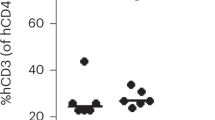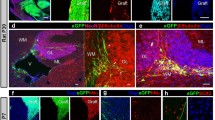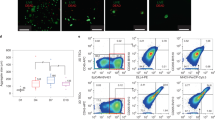Abstract
EXPERIMENTS with lethally irradiated mice have shown, that the recovery of the immune response to sheep red blood cells (RBC) by transplantation of bone marrow cells is conditioned by the host thymus1,2, and that the thymus promotes differentiation of cells derived from the bone marrow to immunologically competent cells3,4. The tissue in which cells from bone marrow acquire immunological competence under thymic influence has not been identified. That the thymus itself may be the site of this differentiation is suggested by the finding of donor mitotic cells of bone marrow origin in the host thymus of mouse radiation chimaeras5. Although these results show migration of bone marrow-derived cells to the thymus, they do not specify whether the donor cells detected in the thymus have gained any immunological competence.
This is a preview of subscription content, access via your institution
Access options
Subscribe to this journal
Receive 51 print issues and online access
$199.00 per year
only $3.90 per issue
Buy this article
- Purchase on Springer Link
- Instant access to full article PDF
Prices may be subject to local taxes which are calculated during checkout
Similar content being viewed by others
References
Miller, J. F. A. P., Doak, S. M. A., and Cross, A. M., Proc. Soc. Exp. Biol. and Med., 112, 785 (1963).
Cross, A. M., Leuchars, E., and Miller, J. F. A. P., J. Exp. Med., 119, 837 (1964).
Doria, G., and Agarossi, G., Transplantation, 6, 218 (1968).
Doria, G., and Agarossi, G., Proc. US Nat. Acad. Sci., 58, 1366 (1967).
Ford, C. E., and Micklem, H. S., Lancet, 1, 359 (1963).
Agarossi, G., and Doria, G., Transplantation, 6, 419 (1968).
Jerne, N. K., and Nordin, A. A., Science, 140, 405 (1963).
Claman, H. N., Chaperon, E. A., and Triplett, R. F., J. Immunol., 97, 828 (1966).
Cheng, V., and Trentin, J. J., Fed. Proc., 26, 641 (1967).
Perkins, E. H., Robinson, M. A., and Makinodan, T., J. Immunol., 86, 533 (1961).
Doria, G., Goodman, J. W., Gengozian, N., and Congdon, C. C., J. Immunol., 88, 20 (1962).
Miller, J. F. A. P., in Thymus (edit. by Wolstenholme, G. E. W., and Porter, R.), 153 (Churchill, London, 1966).
Davies, A. J. S., Leuchars, E., Wallis, V., Marchant, R., and Elliot, E. V., Transplantation, 5, 222 (1967).
Mitchell, G. F., and Miller, J. F. A. P., Proc. US Nat. Acad. Sci., 59, 296 (1968).
Osoba, D., Proc. Soc. Exp. Biol. and Med., 127, 418 (1968).
Author information
Authors and Affiliations
Rights and permissions
About this article
Cite this article
DORIA, G., AGAROSSI, G. Immunologically Competent Thymus Cells of Bone Marrow Origin. Nature 221, 871–873 (1969). https://doi.org/10.1038/221871a0
Received:
Revised:
Issue Date:
DOI: https://doi.org/10.1038/221871a0
This article is cited by
-
The localization of a histamine H2-receptor adenylate cyclase system in canine parietal cells and its inhibition by prostaglandins
Agents and Actions (1978)
-
Genetic control of the immune response
Folia Microbiologica (1972)
Comments
By submitting a comment you agree to abide by our Terms and Community Guidelines. If you find something abusive or that does not comply with our terms or guidelines please flag it as inappropriate.



